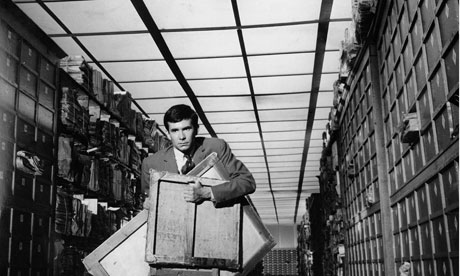← Back to Reviews
in
The Trial, 1962, Welles

Orson Welles, The Trial, is not at all a court room drama. It's a twisted dream like piece, in a poetic format. A film that's always on track, but that never makes sense. It's a study of human nature and us as a society. My favorite scene is when the protagonist Joseph, is being interrogated and asked almost as it it's obvious if he's victim of society. He responds in his highest form of confidence "I am a member of society". I think this isn't said at all anymore, everyone must be an individual and no one ever admits of being a contributing member of society. The basic outline of the story is Joseph is "arrested" with not charge, he then goes through an insane legal process. Comparable to the U.S. justice system in a way.
This is my second favorite Orson Welles piece, after Touch Of Evil. The director believed this was his most accomplished film despite the critics early hatred. I could certianly see why this would be viewed as his strongest. In adapting Franz Kafka, it always feels made for cinema. He once again uses shadows and beautiful cinematic shots. With bizarre imagery of elderly waiting for a court ruling that'' never come, or a group of what we can assume are prisoners standing in the cold with nothing but rags. I can't complain to say understood all the metaphors, but I connected with the drift of ideas.
Oliver who's played by Anthony Peck, still has Norman Bates characteristics. The queer like awkward man always feels nervous and uncomfortable. He strokes his hands along walls when he walks, and runs away from an awkward situation. He starts standing up for himself later on but is always much so of a coward. He critiques the others who are hopelessly waiting for there court result shouting "you don't see me doing it" while sub consciously trapping himself.
A scene that demonstrates a kind of serfdom to the lawyers, is when we see a elderly pathetic man pleading to his. On his knees and kissing his hands only to be shunned away. Oliver looks in disgust and pity, but the man will do anything to here a word about his case. It's a disturbing scene and the one that can describe the movie the best, other than prologue. In conclusion this film is mesmerizing. It's a nightmare, with no true logic, but actual ideas. Similar to Kubricks, Eyes Wide Shut, an exposure to the inside of the system. Orson Welles narrates the closing credits, almost as a dog pees on his land, I think this his way of separating from the Kafka novel and claiming as a personal piece.

Orson Welles, The Trial, is not at all a court room drama. It's a twisted dream like piece, in a poetic format. A film that's always on track, but that never makes sense. It's a study of human nature and us as a society. My favorite scene is when the protagonist Joseph, is being interrogated and asked almost as it it's obvious if he's victim of society. He responds in his highest form of confidence "I am a member of society". I think this isn't said at all anymore, everyone must be an individual and no one ever admits of being a contributing member of society. The basic outline of the story is Joseph is "arrested" with not charge, he then goes through an insane legal process. Comparable to the U.S. justice system in a way.
This is my second favorite Orson Welles piece, after Touch Of Evil. The director believed this was his most accomplished film despite the critics early hatred. I could certianly see why this would be viewed as his strongest. In adapting Franz Kafka, it always feels made for cinema. He once again uses shadows and beautiful cinematic shots. With bizarre imagery of elderly waiting for a court ruling that'' never come, or a group of what we can assume are prisoners standing in the cold with nothing but rags. I can't complain to say understood all the metaphors, but I connected with the drift of ideas.
Oliver who's played by Anthony Peck, still has Norman Bates characteristics. The queer like awkward man always feels nervous and uncomfortable. He strokes his hands along walls when he walks, and runs away from an awkward situation. He starts standing up for himself later on but is always much so of a coward. He critiques the others who are hopelessly waiting for there court result shouting "you don't see me doing it" while sub consciously trapping himself.
A scene that demonstrates a kind of serfdom to the lawyers, is when we see a elderly pathetic man pleading to his. On his knees and kissing his hands only to be shunned away. Oliver looks in disgust and pity, but the man will do anything to here a word about his case. It's a disturbing scene and the one that can describe the movie the best, other than prologue. In conclusion this film is mesmerizing. It's a nightmare, with no true logic, but actual ideas. Similar to Kubricks, Eyes Wide Shut, an exposure to the inside of the system. Orson Welles narrates the closing credits, almost as a dog pees on his land, I think this his way of separating from the Kafka novel and claiming as a personal piece.
